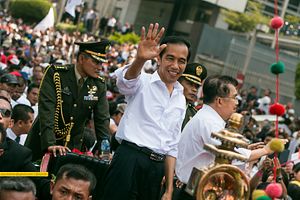President Joko Widodo wasted no time in beginning to make inroads on key priorities after the October inauguration of his second term in Indonesia. While his rhetoric has typically focused on slashing red tape and reforming the bloated bureaucracy, a major announcement in the tail end of November on ideology within the ranks marks a seriousness in deeper reform. The execution of this approach, however, may produce more problems than it solves.
Cabinet choices showed a clear focus on a renewed war against extremist ideology, despite rhetoric focusing still on infrastructure and economic growth. The naming of retired general Fachrul Razi as minister for religion, the first former military man to head the post since Suharto, and former national police chief Tito Karnavian as home minister, set a tone for programs since announced. The civil service, known as ASN, and Indonesia’s mammoth bureaucracy, is the first explicit target for rooting out extremist ideology.
As noted by ANU’s Liam Gammon for Inside Story shortly after the naming of the cabinet, moderates have showed fear that broad organizations have been “colonized by sympathizers of radical groups like the now-banned Hizbut Tahrir Indonesia or the mainstream Islamist party PKS.” The targeting has begun in earnest with the launch of Aduan ASN, an online portal for the submission of complaints of civil servants engaging in “Radikalisme Negatif” or “negative radicalism.”
These complaints include any violations of intolerance, against the founding philosophy of Pancasila or anything else which would threaten national unity. Aduan ASN’s FAQ section lists what types of rhetoric should be reported but ends with a vague “other.” A joint decree for the program has received resounding support from a slew of ministries, intelligence agency BIN, national counterterrorism agency BNPT, and agencies dealing with the civil service.
Conceptually, the program is reasonable, if not overdue. But, in action, the limitations will become clear. The decree itself focuses primarily on the sharing of this sort of content on social media — and singles out sharing of fake news and hoaxes — but also notes engaging, whether “liking,” commenting or otherwise, on a social media post is grounds for reporting. The “harassment” of undefined “national symbols” is also included.
Ill-defined violations and the ability for any national, whether employed as a civil servant or not, to file a report leaves the program ripe for exploitation and weaponization. Pre-election social divisions have been widely documented, but still continue despite the political elite brokering friendly alliances. Instances of the weaponization of existing legislation, like blasphemy laws and the Information and Electronic Transactions Act (UU ITE), targeting minorities and dissident voices are on the rise. Reports to the police have more than doubled from 2017 to this year, with police investigating just over 3,000 cases so far in 2019, according to the organization’s own data.
A report released last year from the Southeast Asia Freedom of Expression Network (SAFEnet) found that nearly a third of all cases which had been reported since 2008 were reported by civil servants and other government officials. In an analysis for the Conversation, Amnesty International researcher and Indonesia Jentera School of Law academic Usman Hamid noted that many of these cases rely on favorable interpretation of the law.
“The vague definitions within the Information Law make it prone to misuse by law enforcement officials during criminal investigation or judicial proceedings,” he wrote of ITE. That vagueness also exists for Aduan ASN and the simple act of reporting falls short of the low prosecution bar, setting it up for abuse to settle old grudges or tarnishing the reputation of targets through reports that may be well-meaning but ill-informed.
Tackling radicalism within the civil service, like in all institutions, is desperately needed. But placing a “snitch” platform at the center of the campaign establishes a witch hunt as a major tactic, rather than genuine, fundamental reform. Add that to broader problems including the wide net that could be cast in cracking down on intolerance and the rights issues it could produce, and it all suggests that unless caution is exercised, a war on extremism could end up creating more problems in Indonesia than it actually solves.

































